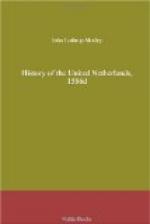The Earl complained, too, that the influence of Buys with Hohenlo and young Maurice of Nassau was most pernicious. Hohenlo had formerly stood high in Leicester’s opinion. He was a “plain, faithful soldier, a most valiant gentleman,” and he was still more important, because about to marry Mary of Nassau; eldest slaughter, of William the Silent, and coheiress with Philip William, to the Buren property. But he had been tampered with by the intriguing Paul Buys, and had then wished to resign his office under Leicester. Being pressed for reasons, he had “grown solemn,” and withdrawn himself almost entirely.
Maurice; with his “solemn, sly wit,” also gave the Earl much trouble, saying little; but thinking much, and listening to the insidious Paul. He “stood much on making or marring,” so Leicester thought, “as he met with good counsel.” He had formerly been on intimate terms with the governor-general, who affected to call him his son; but he had subsequently kept aloof, and in three months had not come near him. The Earl thought that money might do much, and was anxious for Sir Francis Drake to come home from the Indies with millions of gold, that the Queen might make both Hohenlo and Maurice a handsome present before it should be too late.
Meantime he did what he could with Elector Truchsess to lure them back again. That forlorn little prelate was now poorer and more wretched than ever. He was becoming paralytic, though young, and his heart was broken through want. Leicester, always generous as the sun, gave him money, four thousand florins at a time, and was most earnest that the Queen should put him on her pension list. “His wisdom, his behaviour, his languages, his person,” said the Earl, “all would like her well. He is in great melancholy for his town of Neusz, and for his poverty, having a very noble mind. If, he be lost, her Majesty had better lose a hundred thousand pounds.”
The melancholy Truchsess now became a spy and a go-between. He insinuated himself into the confidence of Paul Buys, wormed his secrets from him, and then communicated them to Hohenlo and to Leicester; “but he did it very wisely,” said the Earl, “so that he was not mistrusted.” The governor always affected, in order to screen the elector from suspicion, to obtain his information from persons in Utrecht; and he had indeed many spies in that city; who diligently reported Paul’s table-talk. Nevertheless, that “noble gentleman, the elector,” said Leicester, “hath dealt most deeply with him, to seek out the bottom.” As the ex-Advocate of Holland was very communicative in his cups, and very bitter against the governor-general, there was soon such a fund of information collected on the subject by various eaves-droppers, that Leicester was in hopes of very soon hanging Mr. Paul Buys, as we have already seen.




